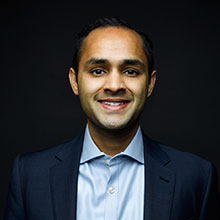
The MedCity INVEST Digital Health conference is scheduled for September 28 in Dallas, in collaboration with Health Wildcatters at Pegasus Park. There, eight healthcare startups focused on employee benefits will square off in the Pitch Perfect contest. Three investor judges will hear these companies present and ask questions of their business model and approach, deciding on the winner.
The judges include Kyoko Watanabe, managing director with DEFTA Partners, Matthew Blum, a principal with Cigna Ventures, and Parth Desai, a principal with Flare Capital Partners.
In response to emailed questions, Desai talked about his firm’s investment strategy, how he works with startups, and what he wishes more startups would do.

Parth Desai
What is your firm’s investment strategy?
To invest in healthcare technology, digital health, and healthcare services companies that improve health outcomes and broaden access while lowering costs of care. We are focused on early stage opportunities in healthcare technology innovation, and our investors include leading healthcare companies, major institutional investors, important family offices, foundations, and sovereign wealth funds. We are full life-cycle investors in our portfolio companies as we work alongside entrepreneurs over their entire company-building journey
To check out the full agenda for INVEST Digital Health, click here.
What was the last healthcare investment you made (that you can talk about) and why did you make it?
We recently invested in a Seed stage company called SmarterDx, which uses artificial intelligence to automatically identify missed clinical codes that yield additional revenue for hospitals and improves their care quality performance. With hospitals currently struggling financially and seeking operational efficiency, SmarterDx’s attributable impact on both the top and bottom line is resonating well with their customers. This initial wedge sets the company up to become a de-facto clinical and financial data layer for healthcare entities, enabling a range of future product opportunities.
What sets your firm apart in how you work with startups?
We have a unique LP base of 30+ strategics that represent the healthcare ecosystem (think health systems, regional and national health plans, retail pharmacy, pharma, diagnostics, and med device organizations). We leverage those relationships to accelerate the growth of our portfolio companies; those groups have contributed over $600 million in revenue to our portfolio companies over the years.
What’s one thing you wish more healthcare startups did?
Focusing on quantifying and building a differentiated return-on-investment (ROI) story that is clearly attributable to their product. While big markets, great teams and first-in-class products can be catalysts in helping startups execute their early sales, ultimately it’s the ROI story (lower costs, improving quality of care, or even surfacing new revenue opportunities for enterprises) that we have found creates durability and scale. Getting this right early on is important.
What do you like the most about being a healthcare investor?
The opportunity to constantly learn new things about the healthcare industry from such a diverse and exceptionally intelligent range of entrepreneurs and partners, as well as the challenge of transforming such a complex industry.
Photo: Natalie Mis, Getty Images













